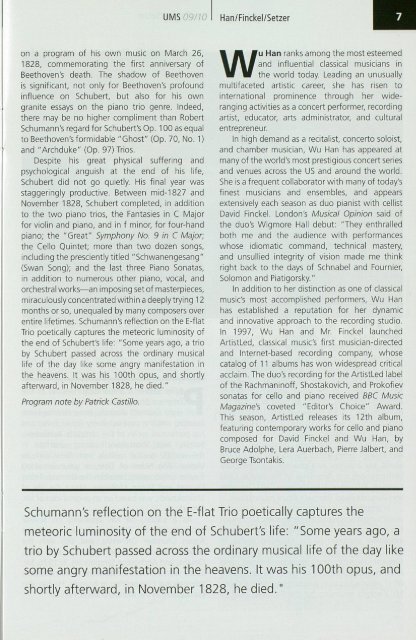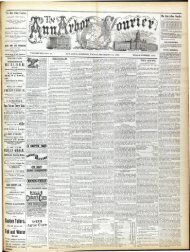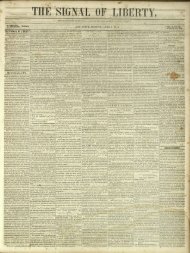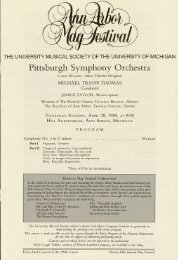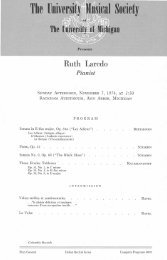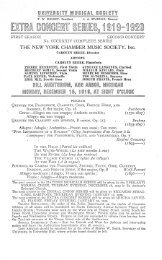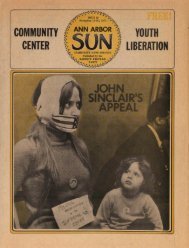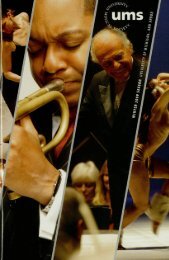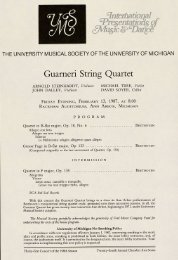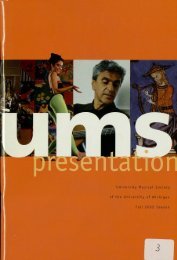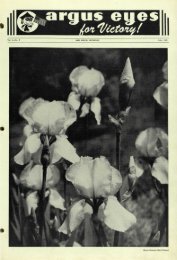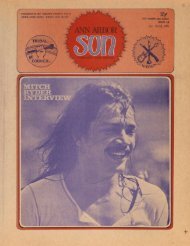university musical society - Ann Arbor District Library
university musical society - Ann Arbor District Library
university musical society - Ann Arbor District Library
Create successful ePaper yourself
Turn your PDF publications into a flip-book with our unique Google optimized e-Paper software.
on a program of his own music on March 26,<br />
1828, commemorating the first anniversary of<br />
Beethoven's death. The shadow of Beethoven<br />
is significant, not only for Beethoven's profound<br />
influence on Schubert, but also for his own<br />
granite essays on the piano trio genre. Indeed,<br />
there may be no higher compliment than Robert<br />
Schumann's regard for Schubert's Op. 100 as equal<br />
to Beethoven's formidable "Ghost" (Op. 70, No. 1)<br />
and "Archduke" (Op. 97) Trios.<br />
Despite his great physical suffering and<br />
psychological anguish at the end of his life,<br />
Schubert did not go quietly. His final year was<br />
staggeringly productive. Between mid-1827 and<br />
November 1828, Schubert completed, in addition<br />
to the two piano trios, the Fantasies in C Major<br />
for violin and piano, and in f minor, for four-hand<br />
piano; the "Great" Symphony No. 9 in C Major,<br />
the Cello Quintet; more than two dozen songs,<br />
including the presciently titled "Schwanengesang"<br />
(Swan Song); and the last three Piano Sonatas,<br />
in addition to numerous other piano, vocal, and<br />
orchestral works—an imposing set of masterpieces,<br />
miraculously concentrated within a deeply trying 12<br />
months or so, unequaled by many composers over<br />
entire lifetimes. Schumann's reflection on the E-flat<br />
Trio poetically captures the meteoric luminosity of<br />
the end of Schubert's life: "Some years ago, a trio<br />
by Schubert passed across the ordinary <strong>musical</strong><br />
life of the day like some angry manifestation in<br />
the heavens. It was his 100th opus, and shortly<br />
afterward, in November 1828, he died."<br />
Program note by Patrick Castillo.<br />
UMS 09/1 i Han/Finckel/Setzer<br />
Wu Man ranks among the most esteemed<br />
and influential classical musicians in<br />
the world today. Leading an unusually<br />
multifaceted artistic career, she has risen to<br />
international prominence through her wide-<br />
ranging activities as a concert performer, recording<br />
artist, educator, arts administrator, and cultural<br />
entrepreneur.<br />
In high demand as a recitalist, concerto soloist,<br />
and chamber musician, Wu Man has appeared at<br />
many of the world's most prestigious concert series<br />
and venues across the US and around the world.<br />
She is a frequent collaborator with many of today's<br />
finest musicians and ensembles, and appears<br />
extensively each season as duo pianist with cellist<br />
David Finckel. London's Musical Opinion said of<br />
the duo's Wigmore Hall debut: "They enthralled<br />
both me and the audience with performances<br />
whose idiomatic command, technical mastery,<br />
and unsullied integrity of vision made me think<br />
right back to the days of Schnabel and Fournier,<br />
Solomon and Piatigorsky."<br />
In addition to her distinction as one of classical<br />
music's most accomplished performers, Wu Han<br />
has established a reputation for her dynamic<br />
and innovative approach to the recording studio.<br />
In 1997, Wu Han and Mr. Finckel launched<br />
ArtistLed, classical music's first musician-directed<br />
and Internet-based recording company, whose<br />
catalog of 11 albums has won widespread critical<br />
acclaim. The duo's recording for the ArtistLed label<br />
of the Rachmaninoff, Shostakovich, and Prokofiev<br />
sonatas for cello and piano received BBC Music<br />
Magazine's coveted "Editor's Choice" Award.<br />
This season, ArtistLed releases its 12th album,<br />
featuring contemporary works for cello and piano<br />
composed for David Finckel and Wu Han, by<br />
Bruce Adolphe, Lera Auerbach, Pierre Jalbert, and<br />
George Tsontakis.<br />
Schumann's reflection on the E-flat Trio poetically captures the<br />
meteoric luminosity of the end of Schubert's life: "Some years ago, a<br />
trio by Schubert passed across the ordinary <strong>musical</strong> life of the day like<br />
some angry manifestation in the heavens. It was his 100th opus, and<br />
shortly afterward, in November 1828, he died."


